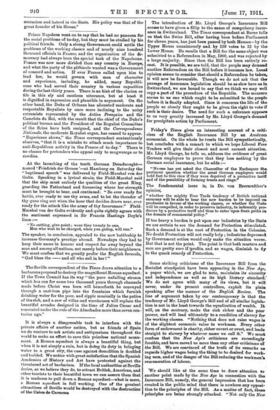Some striking criticisms of the Insurance Bill from the Socialist
standpoint have been appearing in the New Age, a paper which, we are glad to note, maintains its sincerity and independence as well as its high literary standard. We do not agree with many of its views, but it will never, under its present controllers, exploit its plain speaking after the manner of the English Review. The line of argument taken by our contemporary is that the tendency of Mr. Lloyd George's Bill and of all similar legisla- tion is not in the least towards the equalization of wealth. It will, on the contrary, make the rich richer and the poor poorer, and will lead ultimately to a condition of slavery for the working classes. "Nothing that does not raise wages is of the slightest economic value to workmen. Every other form of endowment is charity, either covert or overt, and leads straight to slavery by whatever name we call it." We must confess that the New Age's criticisms are exceedingly forcible, and have moved us more than any other criticisms of the Bill. We are convinced of the truth of its remarks as regards higher wages being the thing to he desired for work. ing men, and of the danger of the Bill reducing the workmen's remuneration of labour.










































 Previous page
Previous page